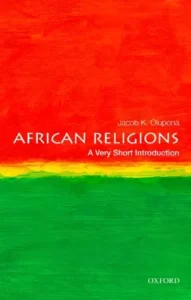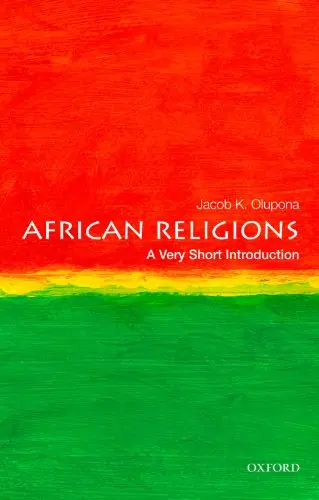 What are African religions? African Religions: A Very Short Introduction answers this question by examining primarily indigenous religious traditions on the African continent, as well as exploring the impacts of Christianity and Islam. It focuses on the diversity of ethnic groups, languages, cultures, and worldviews, emphasising the continent’s regional diversity.
What are African religions? African Religions: A Very Short Introduction answers this question by examining primarily indigenous religious traditions on the African continent, as well as exploring the impacts of Christianity and Islam. It focuses on the diversity of ethnic groups, languages, cultures, and worldviews, emphasising the continent’s regional diversity.
While generalisation across this wide swathe of beliefs and practices is difficult, many African traditional and indigenous religions share common elements. Many have been closely linked to ethnicity and family heritage and have lacked provisions for formal conversion, though this trend has changed in recent decades. Oral storytelling plays a prominent role in many of these traditions, as does the worship of specific lands and natural spaces. Due to the malleable and inclusive nature of many African traditional and indigenous worldviews, these faiths are often practised in conjunction with other traditions, such Christianity, Islam, and humanism.
Worldviews
African religious worldviews permeate economics and politics on the continent, where the sacred and the secular realms influence one another. Although it is difficult to generalise about African traditional worldviews, a common denominator among them is a three-tiered model in which the human world exists between the human realm and the sky and the earth (including the underworld)—a schema that is not unique to Africa but found in many of the world’s religious systems.
Cosmology and Myths
The flexibility characterising African religious traditions stems, in part, from the reliance on oral as opposed to written narratives, whose purported timelessness grants them authority. African traditional religions are communally maintained and routinely change in response to people’s lived experiences and needs. History and myths are seen as containing truth. In many African communities myths and history are effectively indistinguishable; both belong to the same genre.
Gods, Ancestors and Spirit Beings
In African indigenous religions, the principal deities, spirits, gods, ancestors along with personal and impersonal forces are regarded as active forces in the created world, with theistic and non-theistic notions of supernatural forces embedded in the various cosmologies. African pantheons of gods, goddesses, spirits and other non-human beings are varied in number and complex in character. Deities inhabit a world primarily created for humans and they exert extraordinary influence over day-to-day human affairs.
The relationship between the many gods and the Supreme God varies from region to region, people to people. Some groups regard the Supreme God as co-equal with the deities, as a first among equals, or a king among chiefs. The complex interconnectivity between the Supreme God and the lesser divinities makes it difficult to classify African religions as monotheistic or polytheistic. The notion, or the discussion of the Supreme God is a result of the introduction of Christianity and Islam.
Ancestors
Ancestral tradition—the veneration of deceased parents and forebears—constitutes a key aspect of African religions. Some traditions regard ancestors as equal if not superior to the deities within the pantheon; also, it is not always easy to make a distinction between ancestors and divinities. Other traditions centralise ancestral veneration because it remains instrumental of lineage, clan and family formations. Ancestors, having transcended the human realm, occupy a higher realm of existence and are equipped to bestow honour an blessings on the living members of their lineage.
Sacred Authority
The King of England is both the head of secular government and the titular head of the Church of England. Leaders in African traditional systems impact secular and religious wisdom and guidance to their subjects, while being custodians and guardians of religious centres such as shrines, temples and sacred forests.
In some cases, Kings are also said to possess mystical life-sustaining powers, with their own well-being intimately entwined with the well-being of their people, lands and institutions. For this reason, African kings are often the subject of extremely strict taboos that address how their person can be treated.
Rites of Passage
Tumdo or “male initiation” among the Nandi of Kenya contains several traits common to rites of passage across the continent. Boys belonging to the same age set move away from their parents’ homes to dwell in a secluded lodge constructed solely for the ritual’s duration. Secret knowledge passes from older men to the boys throughout their time of separation from the community. At the same time, this period serves a practical purpose, preparing boys for adulthood in Nandi society. Tests of bravery and concentration also characterise this initiation. The young boys face challenges, such as having to stare unflinchingly at a grotesque masked figure that threatens them with a spear. The goal is to keep one’s eyes on the spearhead Without looking away in fear or attuning to the raucous distractions created by the other boys. The spearhead challenge teaches boys to discern immediate priorities from mere distractions. It asks them to develop self-control, and mental and emotional discipline when faced with fear. In other words, manhood requires a mature disposition cultivated by experience. The initiation offers boys preliminary encounters With fear, uncertainty, and psycho-emotional challenges.
Dipo, an initiatory rite among Krobo women in Ghana, does not. The seminal moment in the ceremony requires girls to sit on a stone made sacred by its connection to Krobo Mountain and the Earth goddess, Nana Kloweki. If the initiand successfully sits down and rises from the stone three times, she passes the purity test. Dipo transitions Krobo girls into womanhood by teaching them aesthetics, dance, and household responsibilities. They learn to grind corn, to sweep, and how to wear traditional women’s clothing. Until the early nineteenth century, the initiation required the girls’ seclusion on Mount Krobo for several months. Economic changes and the adoption of the English academic calendar now cause communities to complete the process within one short week. Nevertheless, the spiritual and social significance remains the same.
Dipo serves a pivotal function of purifying girls, thereby making them Krobo women. Ritual cleanliness enables initiates to eat at their neighbour’s home and to marry within the community. Krobo diviners conduct ritual cleanings by sprinkling the person’s feet with blood from a red hen, symbolically transferring the person’s impurity into the animal. Afterward, the diviner slays a white hen and repeats the gestures, thereby removing all misfortune and cleansing her. Preparing girls for womanhood, in this context, involves more than pragmatic instruction. The priestess and the diviner pray over the girls constantly, invoking prosperity, safety, fecundity, peace, and well—being. Idealised Krobo womanhood is about being a successful, contributing member of society who lives peacefully and brings respect to her community.
Modern Conflict
Today, there is no place on the African continent that polytheism—the worship of multiple gods—is not extremely controversial and embattled. In past centuries—and in fact, until very recently—African traditional religions were often practised alongside Islam and Christianity. This is not interreligious relations in practice – there were certainly periods of intense religious conflict, holy war and jihad. Nonetheless, inter-religious relations in Africa today have achieved a nearly unprecedented fever pitch of intolerance, thanks in large part to the rapidly growing popularity of radical forms of Evangelical Christianity and Islam. While Muslims and Christians routinely and sometimes violently clash over the control of the public sphere and people’s souls, they share a common enemy in practitioners of African traditional religions. Traditional religion practitioners are often wrongly branded as pagans, witches and sorcerers.
Contemporary African Religion
African indigenous religion in contemporary Africa struggles to maintain its legal tone and identity in the face of the forces of Islam and Christianity. Not surprisingly, this battle against indigenous religions has too often resulted in their being seen as no more than superstitions, magic, and fetishism. There is an improper view among adherents of Islam and Christianity that indigenous religions are little more than clandestine practices that one might turn to as an immoral source of power. This is perceived as a rise in pseudo-ritual practices and activities in Africa that claim to be traditional religious practices.
The Internet
African religious practices are booming, partly because of visual and social media. It is not uncommon to read of online prayer sessions organised by priests in Kenya, Nigeria and the United States. These prayer sessions create communities of cyber-space worshippers united in the common purpose of sharing prayers that address existential and daily concerns of worshippers. Attracting millions of worshippers who join marathon daily prayers, weekly praise and worship sessions, monthly and yearly conventions and revival meetings, these new cyber methods encourage millions of devotees across the globe to participate in the traditions.
In the United States, Europe and Asia, many priests of Yoruba, Orisa and Ifa traditions have created houses of worship that make use of these new technologies for devotional practices. Since the late 20th century, African religions have assumed a new identity as transnational and global religion.

![]()

